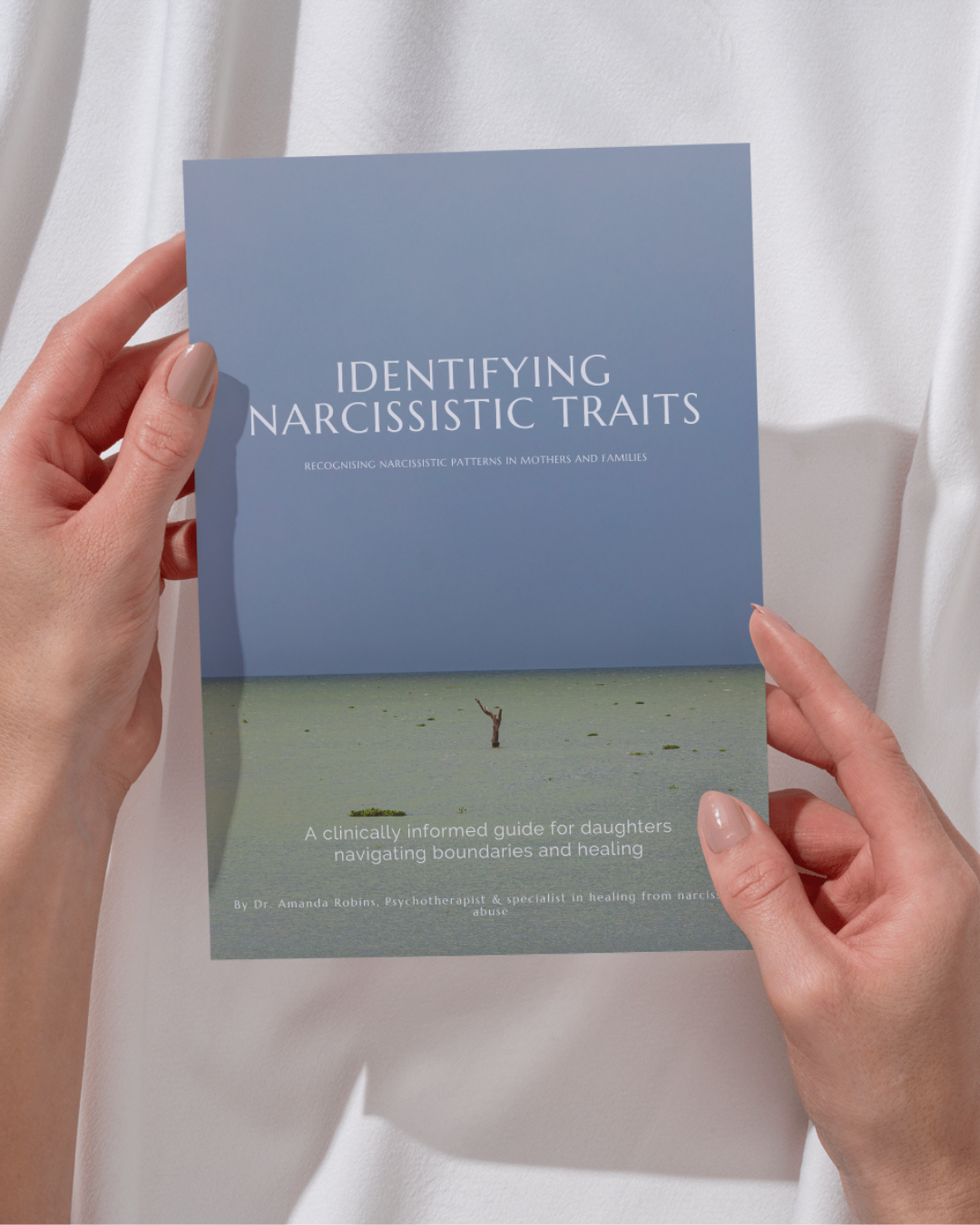Narcissistic Mother Symptoms: Signs You May Have Grown Up With a Narcissistic Parent
“
If you were raised by a narcissistic mother, you may still feel self-doubt, guilt or chronic shame long after childhood. Common symptoms include low self-esteem, an overactive inner critic, perfectionism, people-pleasing and persistent feelings of inadequacy. Understanding these patterns is the first step toward healing and reclaiming your own identity.”
TABLE OF CONTENTS
What are the signs of a narcissistic mother?
What does it really mean to be raised by a narcissistic mother?
How to manage a relationship with a narcissistic mother
FAQs for daughters of narcissistic mothers
How can I recover from a narcissistic mother?
WHAT ARE THE SIGNS OF BEING RAISED BY A NARCISSISTIC MOTHER?
Here are some signs and symptoms you need to look out for. Have basic questions? See Narcissistic mother: FAQs for Daughters (Signs, Boundaries, Contact)
1.Low Self-Esteem
Your feelings of worthlessness didn’t come from nowhere. Although many children of narcissists don’t consciously experience these difficult feelings, they are still there, running in the background and influencing your everyday life. Your choices, your relationships and your ability to withstand stress are all affected by low self-worth.
Narcissistic parents raise their children to believe that their authentic self is somehow flawed. These parents use shame to try to control their children, forcing them to meet the parent’s needs. Anything that doesn’t coincide with the parent’s point of view is belittled or dismissed. The child is shamed for having opinions, feelings or needs of their own, resulting in an ongoing sense of inadequacy and worthlessness.
2. Powerful Inner Critic
The ever present narcissist-in-residence in your head. Do you hear your mother’s voice whenever you make a mistake, hesitate, or fail to be generally fabulous? Some people seem to have a constant harping critic inside them, commenting and criticising their every move. The problem for most of us is that the voice isn’t always recognisable, its just there as an ongoing presence, poisoning our relationship with ourselves and making life much harder.
For those of us who grew up with a narcissistic mother, the voice is normally hers, harping, criticising, judging and making us feel that we will never, ever be good enough.
3. Perfectionism
Daughters of narcissists often start projects (careers, businesses, relationships) but never finish them due to the need to make everything perfect. If we can’t perfect, we discard or distract ourselves, procrastinating until it’s too late to actually achieve anything.
The need to be perfect stops us in our tracks.
We often suffer terrible anxiety worrying that all our decisions are somehow wrong, bad or misguided. But getting anywhere in life means sometimes making mistakes or being wrong. Mistakes are part of the learning curve and without the ability to withstand our own failures and have faith in ourselves we will never achieve anything.
Daughters of narcissists can spend their lives self-sabotaging through procrastination, questioning every decision they make. The looming prospect of taking a risk often paralyses them, preventing them from pursuing their talents and succeeding in a business or a career.
4. People Pleasing
Daughters of narcissistic mothers often don’t know their own minds. They are usually so desperate to avoid anger or criticism from others that they will mould themselves to the needs of friends, colleagues, employers, lovers and family members. They people please so efficiently that they forget their own needs. They will often end up feeling secretly resentful and unfulfilled, unaware of what the problem actually is, or how to fix it.
5. Chronic Shame
Narcissists are shame averse and will usually project their shame onto others (including their children) as a way of avoiding experiencing it themselves. A mother who is narcissistic will also put her own shame into her children through projection, eye contact and facial expressions (e.g. disgust), leaving a lifelong legacy of chronic shame.
Narcissistic mothers also use shame as a parenting strategy without making themselves available for soothing and repair. The strong emotions elicited by shame are too hard for a young child to manage on their own and can lead to the child using dissociation or other problematic ways of coping. Children are extremely sensitive to shaming and will internalise these feelings, carrying them inside themselves well into adulthood.
In her article, Daughters of Narcissistic Mothers, Darlene Lancer writes about the toxic shame narcissistic parents cause their children:
“She rarely, if ever, feels accepted for just being herself. She must choose between sacrificing herself and losing her mother’s love–a pattern of self-denial and accommodation is replayed as codependency in adult relationships.
“Her real self is rejected, first by her mother, and then by herself. The consequence is internalized, toxic shame, based on the belief that her real self is unlovable.”
Most of the time, you won’t be aware of this feeling. It’s like wallpaper — invisible, but always there. The shame you experienced and now carry with you is a habit ingrained through emotionally abusive parenting. Many survivors of narcissistic parenting continue to shame themselves unconsciously when they fail to live up to the impossible standards set by their parents.
“Free Resource for Readers:
Want a deeper understanding of narcissistic behaviours?
Download my free guide: Identifying Narcissistic Traits and learn how to spot manipulation, control, and red flags early.
Get the free guide below.
”
Free Guide: Identifying Narcissistic Traits
6. Sensitivity to Criticism
Narcissists experience their children as an extension of themselves. In order to maintain an inflated and positive experience of self, they need their offspring to be perfect. This means that they are continuously uncomfortable with the mistakes and imperfections inherent in being human.
Narcissistic parents rarely accept failure, or mediocrity. Being ordinary is anathema. So they nitpick, criticise, judge and control. As a result of this lack of acceptance, children of narcissists are extremely sensitive to criticism. Feedback at work, criticism from a partner, even innocent comments from a neighbour can send you into a spiral of self-judgement and shame.
7. Sensitivity to Rejection
Alongside the sensitivity to criticism is a connected and debilitating sensitivity to rejection. These two closely related traits stay with us from a childhood where we were often rejected, criticised and judged. Although rejection sensitivity tends to be more relationship focused, it’s part of the same problem. If our partner or friend makes an insensitive or thoughtless comment, we often catastrophise and self-blame, leading to resentment and ongoing problems in our closest relationships.
The emotional abuse of our past causes us to be pushed us back into our trauma. Rejection sensitvity makes us much more vulnerable in relationships and can stop us from taking the risks needed to find happiness. As adults it’s hard to escape this sensitivity and it can frequently get in the way of having healthy sustainable relationships.
8. Insecure Attachment Style
Most children of narcissistic mothers will have an insecure attachment style. Mothers who are narcissistic just aren’t emotionally available to their children. They are usually too self-focused to be sensitively attuned. This leaves us with the overwhelming sense that relationships are fragile and that we must do all the work to maintain them. We will also be anxious around our partner, never relaxing into the feeling that they will be there for us in the longterm. This in turn can cause us to need constant reassurance, which for some partners can be unwelcome and perhaps overwhelming, leading to the very thing we fear the most - rejection.
9. One Sided Relationships
Children of narcissistic mothers often find themselves in relationships where they are exploited and ignored. Because they have been emotionally abused and rejected by their parents, they haven’t internalised a healthy template for relationships.
They often feel they must give in to others in order to have a relationship, because that is how they were treated as children. They may be attracted to others who trigger their wounds and can sometimes get into relationships with narcissists. Drawn to the tiny crumbs of affection offered by those who may initially appear to be devoted, they are extremely vulnerable to being exploited.
10. Co-Dependency
Well, I have to be careful here. Although I don’t actually believe in the term “co-dependency” I think it is still widely used and has some currency for daughters of narcissists. It provides a shorthand for issues that prevent daughters from being grounded and confident in our intimate relationships.
Although some level of dependency is healthy and normal for all of us, daughters of narcissistic mothers tend to create relationships where their need for the other person is much more intense and central to their sense of wellbeing. In some ways it relates back to an insecure attachment style where the co-dependant person is unable to tolerate distance and has trouble maintaining a stable sense of self in their relationships.
Explore all my eBooks, workbooks and courses →
11. Depression and Anxiety
Depression and anxiety are the result of the deeper wounds to your sense of self. Survivors of narcissistic parenting can be left with a host of issues in adulthood, including problems with relationships. Due to a lack of agency and feelings of helplessness, children of narcissists can get depressed, feeling like there is nothing they can do to improve their lives.
The helpless rage and frustration survivors experienced as emotionally abused children can result in the sense that there is no justice and any step they take will be stymied. Narcissistic parents are often authoritarian and can dominate their children resulting in a sense that they will be punished for taking action on their own behalf. When things go wrong in life, they may be left paralysed, thinking that they are unable to make an impact.
Narcissistic parents don’t model good ways of managing negative emotions like anxiety. They spend little time helping their children learn to self-soothe. Survivors also experience anxiety due to their perfectionism, with fears around criticism and performance anxiety dominating their social interactions.
For survivors, it’s not enough to treat surface symptoms like anxiety and depression without dealing with the underlying trauma and lack of self.
12. Lack of Boundaries
Children of narcissists don’t develop good boundaries growing up, because boundaries are an inconvenience to narcissists. Narcissistic families practice enmeshment and individuals in these families aren’t allowed to develop or have a healthy sense of themselves as separate and autonomous.
Because narcissists generally view their children as an extension of themselves, they discourage any attempts by the child to separate or express their individuality, including having boundaries.
As a result of this “training,” survivors often have trouble saying “no” as well as hearing it, and will be attracted to unhealthy relationships where enmeshment is the status quo.
13. Difficulty Expressing Emotions
For women (and men) who have been raised by a narcissistic mother its hard to know and understand ourselves. We may not know how we are feeling, what’s going on inside us or why we feel the way we do. Because narcissistic mothers are controlling, enmeshing and intrusive they tend to undermine their daughter’s internal world.
Gaslighting, bullying and manipulating their way into absolute control, narcissistic mothers eventually wear their daughters down, creating young women who are people-pleasers. Women raised this way often become self-effacing, unaware and unable to express themselves in a healthy way.
Daughters of narcissistic mothers might “behave” their emotions, or blow up without even knowing they are angry. They may also suppress their own feelings to fit into the needs of others.
14. Problematic Relationship to Anger
Narcissistic parents are often angry. They normally won’t express their anger in a healthy way. Sometimes, they will be verbally abusive, belittling and sarcastic. These passive aggressive ways of expressing anger are used to humiliate and control children.
People raised in these environments can be fearful or easily intimidated. They may be unable to express their own anger in healthy ways and are at risk of becoming bullies or alternatively “pushovers” who don’t know how to set limits.
Parents who teach children that it is not OK to be angry, create adults who are afraid of other people’s anger and their own. In these families, children are often silenced and quickly learn not to assert themselves.
15. Patterns of Self-Destructive Behaviour
Children of narcissists often self-soothe through problematic habits. Drinking, smoking, gambling, overeating, drugs and sex addiction can provide some respite from the painful feelings leftover from childhood trauma, but the price is very high. Adult survivors can also be self-destructive and sabotage their careers or healthy relationships, because they feel they don’t deserve success or happiness.
You may find yourself embroiled in unhealthy dynamics at work or home, due to problematic communication styles, sensitivity to criticism or working models and assumptions from childhood which developed as a result of parental criticism and hostility. Being able to set boundaries, say no and ask for what we want, are essential skills for relationships.
Developing self-compassion can help us choose healthier ways of self-soothing and make better choices.
16. Depleted Sense of Self
Children of narcissists lack a strong sense of self. They often drift along, allowing fate or others to dominate them, as they were dominated by their parents. They often have trouble asking for what they want, because they don’t know themselves well enough to understand their own needs.
Survivors can also have problems asking for what they want in a straightforward way. They can lose themselves in relationships, allowing the other person to set the agenda.
A strong sense of self is crucial to navigating every day life. It stops us from allowing ourselves to be exploited or comparing ourselves to others. It gives us confidence in our abilities. Most importantly, it shapes a strong identity.
17. Competitiveness
Narcissistic parents have unreasonable expectations of their children. They need their children to reflect well on them. They can drive their offspring to be perfectionists with a desperate need to achieve, competing and hoping to succeed in a desperate attempt to win their parent’s love.
Siblings in narcissistic families will often be pitted against one another, competing for the tiny crumbs of affection offered by their parents.
Survivors can often be left with the need to base their self-worth on their achievements, trying in vain to win the affection of their narcissistic parents.
These emotionally abused children can become extremely competitive, poisoning their relationships and making it hard for them to have close friendships or collaborative relationships at work. If they feel they cannot win, they may give up, becoming depressed, bitter or angry, envious of other’s success.
Maybe you don’t have all of these. But most daughters of narcissistic mothers will struggle with many of these issues at some time in their lives.
Being Raised by a Narcissistic Mother
Early experience for daughters often centres on meeting their parent’s emotional needs. Many women describe walking on eggshells, performing for approval, and feeling responsible for a parent’s mood. These patterns can persist into adult relationships until they’re named and addressed.
Growing up with a narcissistic mother
If you have (or had) a narcissistic mother, you may have trouble understanding what really happened. Most daughters grow up confused and unhappy, often blaming themselves for their own trauma symptoms.
The first 5 years of our lives are crucial for brain development. Most of this early brain development takes place in the context of our attachment relationships. In other words, a mother who is narcissistic will heavily influence our social/emotional growth.
Unfortunately, if the misattunement and attachment problems caused by narcissistic parenting are chronic (and they usually are given the nature of narcissism) we end up adapting to the abuse. This, in turn, can lead to a cascading cluster of issues that are not usually resolved without a lot of therapy.
Common threads include chronic self-doubt, guilt when asserting needs, and loyalty binds that make boundary-setting feel “wrong.” If you’re deciding how much contact is workable, this short guide may help.
More about narcissistic mothers and trauma from the blog
How to manage a relationship with a narcissistic mother
If you decide to stay in contact with your narcissistic mother, its best to be realistic about her limitations. She might never change. And you might never get the acknowledgement you crave. Managing your own mother wound in the context of your relationship takes balance, patience and self-awareness. It also takes some therapeutic work.
If you are regularly thrown back into your trauma during interactions with her, you might want to consider seeking therapy to unwind and process your early trauma.
If reading this is helping you recognise patterns but you’re finding it hard to shift them on your own, you can read about working with me here.
More about managing your relationship with your narcissistic mother
FAQs for Daughters of Narcissistic Mothers
1.What is Narcissistic Personality Disorder (NPD)?
NPD is a mental health condition characterised by an inflated sense of importance, a need for excessive attention and admiration, troubled relationships, and a lack of empathy for others. Individuals with NPD often display arrogant, manipulative, and demanding behaviour.
2. How does a narcissistic mother affect her daughter's self-esteem?
Narcissistic mothers often undermine their daughter’s self-esteem by being overly critical, dismissive, and/or competitive. A child growing up in this environment often gets the message that she is a burden. Daughters of narcissistic mothers often experience feelings of worthlessness, self-doubt, and a constant need for validation.
3. What are common traits of a narcissistic mother?
Narcissistic mothers generally don’t have much empathy. They will generally change the conversation around to their own needs or experiences in a way that undermines the daughter’s sense of self and gives her the feeling that she doesn’t matter. The narcissistic mother’s engine needs constant stoking. She is pretty much a bottomless pit requiring admiration and support 24/7.
Narcissistic mothers are often controlling and will use manipulation to achieve their aims. They can be envious and jealous of others whom they believe to possess qualities or attributes that they admire. Unfortunately some narcissistic mothers will end up competing with their daughters, especially at puberty when the young girl reaches sexual maturity. In general, narcissistic mothers have a tendency to see their children as extensions of themselves rather than as autonomous individuals with separate interests and desires.
4.How can daughters of narcissistic mothers set healthy boundaries?
Obviously it’s not going to be easy. Narcissistic mothers generally don’t appreciate the gravy train being derailed. But that doesn’t mean you can’t get some of your time and energy back by being less compliant. You can start setting healthy boundaries by clearly defining what behaviours you will and will not tolerate. I would recommend going small at first and don’t be too hard on yourself if you get it wrong initially. After all, you have had a lifetime of being exploited, undermined and gaslit. Develop assertive communication skills to help manage your relationships and gather supportive people around you. Sometimes the only solution for daughters of narcissistic mothers is to go no-contact.
5. What is 'narcissistic supply' and how does it relate to a narcissistic mother?
Unfortunately, narcissistic mothers are often needy and demanding. Although some mothers might be “ignoring” , it’s generally more common for narcissistic mothers to enmesh their daughters, exploiting their children for emotional support, affection, admiration and validation.
Some daughters can end up being parentified, forced to provide their mothers with the support and attention we would normally associate with a partnership. This can be very damaging in the long term as the young girl learns to ignore her own needs.
6. How can daughters recognise gaslighting from their narcissistic mother?
Gaslighting involves manipulating someone into doubting their own reality or sanity. Narcissistic mothers often use gaslighting to get their needs met or to avoid taking responsibility for their actions. Patterns of denial, contradiction, and misinformation often lead to daughters being confused and disoriented. Being isolated in your own memory of events and your authentic sense of what happened is a lonely experience. Its helpful to have people around you to confirm your reality, but in the long term you will need to learn to believe in yourself rather than seeking external validation.
7. What are the long-term effects of being raised by a narcissistic mother?
Narcissistic mothers raise daughters who often experience chronic low self-esteem and have difficulty trusting others. They often live their lives alongside anxiety and depression and generally face challenges in forming healthy, fulfilling relationships. In general, daughters will have a problematic relationship to themselves, often manifesting in a lack of agency or direction, difficult relationships, self-sabotage, chronic shame and guilt and ongoing nervous system dysregulation.
8. How can daughters heal from the trauma of having a narcissistic mother?
Healing can take a lot of work. I generally recommend seeking therapy to explore and come to terms with your past. Its best to find a therapist who is trauma informed and understands the impact a narcissistic mother can have on her daughter’s development. Alongside therapy, you will want to build a strong support system of people who understand and are empathetic, something you missed out on in childhood.
9. Can a narcissistic mother change?
Change is difficult for people with NPD, as they often lack insight into their behaviour and its impact. While some mothers may seek therapy and improve (although this is unusual), lasting change is rare without consistent and long-term effort.
10. How can daughters cope with feelings of guilt and obligation towards their narcissistic mother?
It’s helpful to acknowledge and validate your feelings. Understanding the manipulative tactics used by your mother can give you perspective. Practicing self-compassion, setting boundaries, and seeking support from therapy and support groups can help you understand and reinforce the validity of your experiences and emotions.
Some More Answers for Daughters of Narcissistic Mothers
HEALING FROM THE TRAUMA OF A NARCISSISTIC MOTHER
How can I recover from a narcissistic mother?
Narcissistic mothers are impactful. Because we are most vulnerable when we are very young, narcissistic mothers tend to cause problems that are difficult to shift. But that doesn’t mean that you can’t recover.
Learning self-awareness and self-compassion will go a long way to helping you heal. Processing your trauma as well as your anger and grief will help you find some solid ground in relationships. Finding yourself and acting on your own values is a big part of the journey.
More about recovering from a narcissistic mother
DOWNLOAD YOUR FREE GUIDE TO NARCISSISTIC TRAITS HERE
Many readers find that naming and recognising narcissistic traits is the first step to breaking free from toxic dynamics.
To support you in this, I’ve created a free guide: Identifying Narcissistic Traits.
You can explore all my ebooks and resources here.
Considering therapy?
You can read more about working with me here.
About the Author
Amanda Robins PhD. is an accredited mental health social worker and psychotherapist based in Melbourne, Australia. She has over a decade of clinical experience supporting adults recovering from complex family dynamics, narcissistic abuse, and relational trauma. Amanda integrates evidence-based psychotherapy with insights from her visual art practice to help clients rebuild self-worth and reconnect with creativity. Learn more →
Amanda Robins PhD
MOST CLICKED FROM OUR BLOG



















































Parentification happens when a child is pushed into adult roles—emotionally, practically, or both—long before they are ready. This article explains how parentification develops, why it is common in narcissistic families, and the lasting impact it has on self-worth, boundaries, and adult relationships.